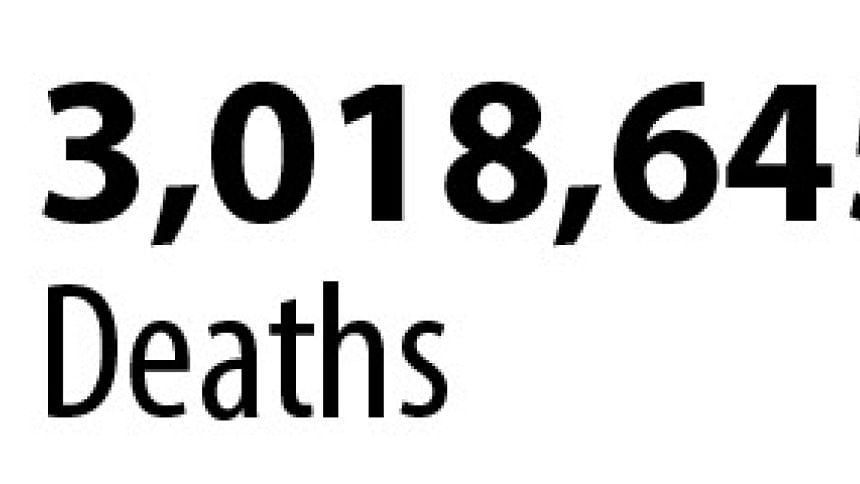Covid death toll passes 3 million
The global Covid-19 death toll passed three million yesterday as the pandemic continues to speed up despite vaccination campaigns, leading countries like India to impose new lockdowns to fight spiralling infection numbers.
It is the latest grim milestone after the novel coronavirus surfaced in central China in December 2019 and went on to infect more than 139 million people, leaving billions more under crippling lockdowns and ravaging the global economy.
An average of more than 12,000 deaths were recorded globally every day in the past week, shooting the overall toll past three million at around 0830 GMT yesterday, according to an AFP tally.
For comparison, three million people is more than the population of Jamaica or Armenia, and three times the death toll of the Iran-Iraq war which raged from 1980-1988.
And the pandemic is showing no sign of slowing down: the 829,596 new infections reported worldwide on Friday is the highest number yet, according to AFP's tally.
The daily average of 731,000 cases registered over the last week is also close to being a record.
India's capital New Delhi went into a weekend lockdown yesterday as the world's second-most populous nation saw record 234,000 new cases and 1,341 deaths.
India now has three times the daily cases of the United States, the world's worst-hit nation, and families are clamouring for drugs and hospital beds.
After a national lockdown a year ago led to an economic slump, the Indian government is desperate to avoid a second stoppage. But Delhi joined Mumbai in ordering all but essential services to close.
The city of more than 20 million people now has the most daily cases in India and restaurants, malls and gyms were all closed. Weddings can go ahead with guests limited to 50 people, while only 20 can attend funerals.
Maharashtra, which includes Mumbai, Gujarat and IT hub Bangalore's home state Karnataka have also imposed restrictions on movement.
Uttar Pradesh state, home to some 240 million people, has ordered a one-day lockdown today.
Similarly, the northern state of Uttarakhand has restricted gatherings to 200 people -- but exempted the huge Hindu Kumbh Mela festival. The gathering in Haridwar has attracted up to 25 million people since January, including some 4.6 million this week alone, with most people ignoring Covid-19 guidelines.
More than 1,600 people tested positive for coronavirus in Haridwar in barely three days this week and experts fear that many devotees will take the virus back to their home towns and villages.
The latest round of voting also went ahead in the West Bengal state election with long queues forming outside polling stations. Rival parties have been holding huge rallies in recent weeks again fuelling super-spreader fears.
Hopes that South Asian countries might have seen the worst of the pandemic have been dashed, with India recording over two million new cases this month alone and Bangladesh and Pakistan imposing new shutdowns.
Udaya Regmi of the international Red Cross said the "truly frightening" South Asian surge was a "wake-up call to the world".
"Vaccines must be available to everyone, everywhere, rich and poor to overcome this terrible pandemic," Regmi added.
Richer countries that have waged mass inoculation efforts have seen their virus numbers plummet. Britain, which has given 60 percent of the population at least one vaccination dose, now records around 30 deaths a day -- down from 1,200 in late January.
Thailand recorded its fourth consecutive day of more than 1,000 new cases yesterday, with spiralling infections linked to a nightlife district of the capital Bangkok earlier this month. Alcohol sales will be banned in Bangkok restaurants from today, while entertainment venues will be shuttered across the country for two weeks.
In Brazil, the country with the third-highest death toll in the world, night shifts have been added to several cemeteries as diggers work around the clock to bury the dead. More than 365,000 people have died from Covid-19 in the country.
But there was better news in Europe, where some countries are easing their lockdowns in response to not only fatigue, but falling infection numbers and progress with vaccinations.
Italy announced Friday it will ease coronavirus restrictions for schools and restaurants from April 26.
Expressing "cautious optimism", Prime Minister Mario Draghi said his government was taking a "calculated risk".
Italy will also allow up to a thousand spectators at outdoor events from May 1, when it eases its stadium fan ban in regions less affected by the coronavirus.
In more good news for Britons after the partial reopening of society this week, Germany on Friday removed the United Kingdom from the list of risk zones for coronavirus infections, meaning that travellers will no longer need to quarantine upon arrival.
Spain meanwhile extended the mandatory quarantine of passengers arriving from 12 countries in South America and Africa, including Brazil and South Africa, over concerns about more transmissible variants.


 For all latest news, follow The Daily Star's Google News channel.
For all latest news, follow The Daily Star's Google News channel. 



Comments